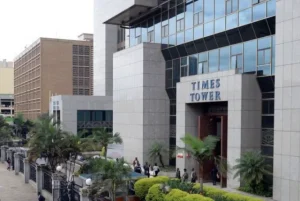Investigations
Audit Exposes How KRA Staff Stole Sh2.5B Monthly In VAT Refund Fraud Scheme
KRA has removed 475 officials—representing 74 percent of the team that handled VAT claims registration applications—from their roles in approving applications for value added tax (VAT) refunds.

The Kenya Revenue Authority (KRA) has uncovered a massive tax fraud operation that has been costing the government at least Sh2.5 billion monthly in lost revenue, following an extensive internal audit that has led to the removal of hundreds of staff members from their positions.
In one of the most significant purges in the tax authority’s history, KRA has removed 475 officials—representing 74 percent of the team that handled VAT claims registration applications—from their roles in approving applications for value added tax (VAT) refunds.
The move comes after investigators identified 4,434 traders linked to fraudulent schemes designed to milk the tax system through fictitious transactions.
The “Missing Trader Scheme”
The audit revealed that hundreds of firms created fake transactions through what is known as the “Missing Trader Scheme,” allowing fraudsters to claim VAT refunds on goods and services where no actual trade occurred.
Only 170 officials out of the initial 645 now handle VAT claims as the taxman tightens controls on the compromised system.
“The authority to approve VAT obligation applications has been significantly restricted,” stated KRA in an internal confidential report.
“This measure is designed to improve oversight and reduce opportunities for fraudulent registrations.”
In this sophisticated fraud scheme, companies simulate genuine trading processes using multiple registered business names while meeting the legal requirements of a ‘supply’ for tax purposes.
However, no actual goods or services are provided, though “payments” are processed to create a notional cost of goods sold, which is then used to claim VAT refunds.
Staggering Losses Uncovered
The taxman estimates that the fraudulent VAT scheme costs approximately Sh2.5 billion in revenue monthly, amounting to Sh30 billion annually.
The losses are even higher when considering invoices filed for income tax purposes.
The audit identified 2,080 traders who sent invoices totaling Sh19.69 billion with VAT implications of Sh2.94 billion but have filed nil or no VAT returns since July 2024.
Meanwhile, beneficiaries claimed purchases worth Sh13.64 billion, resulting in a potential VAT loss of Sh2.14 billion.
Additionally, 2,345 taxpayers filed VAT returns between January and March 2025 but failed to remit VAT payments, with the outstanding amount from these taxpayers standing at Sh2.54 billion from July 2024 to March 2025.
High-Profile Sectors Implicated
The investigation further exposed suspected VAT evasion schemes among sugar importers and suppliers of Kenya Power, with some traders reportedly sending threats to KRA officers to “keep off.”
“One specific group of companies has an outstanding tax of Sh1.1 billion unpaid to date,” the report noted.
“Efforts to collect the amount have elicited threats and innuendos, clearly demonstrative of the lack of commitment to comply with the law.”
Impact on National Revenue
The fraud scheme’s impact has been significant on national revenues. VAT collections fell by 4.3 percent in the six months to December 2024—the first such drop since the Covid-19 pandemic.
Combined collections from both local and import VAT fell to Sh304.1 billion from Sh317.8 billion during the same period in 2023, according to Treasury data.
However, in January 2025, following initial reform efforts, the KRA collected a record Sh34.552 billion in VAT, surpassing previous monthly records.
This improvement has been attributed to the implementation of VAT auto-population of returns, which streamlined the filing process and boosted compliance.
Countermeasures Implemented
To combat the fraud, KRA has implemented several measures:
– Enhanced physical verification checks and more rigorous taxpayer due diligence
– Placement of suspected “missing traders” in a “special table” to disrupt fraudulent activities
– Targeted bulk deregistration of 20,981 inactive taxpayers identified among approximately 90,127 existing VAT obligation cases
– Restricted approval authority for VAT obligation applications
The Treasury now targets collecting an additional Sh177 billion in the new financial year by sealing these revenue leaks.
Kenya Insights allows guest blogging, if you want to be published on Kenya’s most authoritative and accurate blog, have an expose, news TIPS, story angles, human interest stories, drop us an email on [email protected] or via Telegram
-

 Grapevine2 weeks ago
Grapevine2 weeks agoRussian Man’s Secret Sex Recordings Ignite Fury as Questions Mount Over Consent and Easy Pick-Ups in Nairobi
-

 News1 week ago
News1 week agoTHE FIRM IN THE DOCK: How Kaplan and Stratton Became the Most Scrutinised Law Firm in Kenya
-

 Investigations1 week ago
Investigations1 week agoMulti-Million Dollar Fraud: Three Kenyans Face US Extradition in Massive Cybercrime Conspiracy
-

 Economy1 week ago
Economy1 week agoIran Demands Arrest, Prosecution Of Kenya’s Cup of Joe Director Director Over Sh2.6 Billion Tea Fraud
-

 Business1 week ago
Business1 week agoA Farm in Kenya’s Rift Valley Ignites a National Reckoning With Israeli Investment
-

 Africa2 weeks ago
Africa2 weeks agoFBI Investigates Congresswoman Ilhan Omar’s Husband’s Sh3.8 Billion Businesses in Kenya, Somalia and Dubai
-

 Grapevine3 days ago
Grapevine3 days agoA UN Director Based in Nairobi Was Deep in an Intimate Friendship With Epstein — He Even Sent Her a Sex Toy
-

 Politics2 weeks ago
Politics2 weeks agoSifuna, Babu Owino Are Uhuru’s Project, Orengo Is Opportunist, Inconsequential in Kenyan Politics, Miguna Says

















